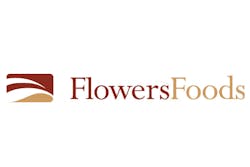Flowers Foods, Inc. Reports First Quarter 2016 Results
THOMASVILLE, Ga., May 18, 2016 /PRNewswire/ -- Flowers Foods, Inc., producer of Nature's Own, Wonder, Tastykake, and other bakery foods, today reported financial results for the company's 16-week first quarter ended April 23, 2016.
First Quarter Summary:
Compared to the prior year first quarter
- Sales increased 5.1% to $1.204 billion. Acquisitions of Dave's Killer Bread (DKB) and Alpine Valley Bread (Alpine) contributed 5.3% to the overall sales increase.
- Achieved EPS of $0.28.
- Costs associated with the conversion of the Tuscaloosa, Ala. bakery to organic production were $2.5 million, or approximately $0.01 per share.
- EBITDA(1) increased 1.7% to $138.6 million.
- Quarterly dividends increased 9.4% to $0.145 per share.
- The company repurchased 5.6 million shares under the previously announced $120 million Accelerated Stock Repurchase (ASR) agreement.
President and CEO Allen Shiver said, "During the first quarter, the team delivered on our priorities as we continued to execute on our strategic plans to drive profitable growth. We realized higher prices for our core white loaf and soft variety bread brands, and added production and distribution support to drive growth of our organic brands, Dave's Killer Bread and Alpine Valley. While a competitive marketplace, unseasonable weather, and costs associated with the Tuscaloosa conversion pressured our earnings this quarter, we are confident we are taking the right steps to position Flowers for continued long-term success. For example, with Nature's Own, our largest brand, we simplified the ingredients in key items, and launched a new marketing campaign emphasizing the brand's 'Good & Simple' positioning.
"The Tuscaloosa bakery is now operational, and early in our second quarter, we introduced the DKB brand to more than 9,000 new stores through our Direct-Store-Delivery (DSD) network. With this introduction and less reliance on co-manufacturing, we expect to begin realizing improved profitability on sales of organic breads while capitalizing on strong consumer demand for organic bakery foods.
"As discussed at our investor briefing in April, we are focusing on margin expansion to drive earnings growth. To that end, we are aggressively improving our promotional effectiveness and increasing consumer awareness of our brands. We are also taking action to eliminate excess cost and leverage our most efficient bakeries. We continue to monitor the landscape for opportunistic acquisitions that will enhance topline growth and improve our overall margin structure."
Shiver concluded, "Flowers' competitive position remains strong. We are benefitting from leading brands, efficient bakeries, and a conservative financial position that allows us to navigate challenges while investing in growth and returning capital to shareholders through dividends and share repurchases. Most importantly, our experienced team understands the marketplace and has a proven track record of consistently growing sales and earnings over the long term."
DSD Segment First Quarter Results Commentary
Of the total DSD segment sales increase, pricing/mix increased 0.2%, volume decreased 1.3%, and the DKB acquisition contributed 4.5%. Excluding the DKB acquisition, price realizations for branded retail products improved during the quarter, but were more than offset by softer volume, driven by decreased promotional activity, fewer number of winter storms in the quarter as compared to the prior year, and a competitive marketplace. The increase in non-retail and other sales was primarily due to volume increases in foodservice, partially offset by price/mix declines. Sales from the DKB acquisition met expectations, and during the first week of the second quarter, the brand was rolled out across Flowers' entire DSD network.
EBITDA margin for the DSD segment decreased as a percentage of sales due to higher workforce-related costs, costs associated with the conversion of the Tuscaloosa bakery to an organic facility, and increases in outside purchases of product, primarily due to capacity constraints at DKB. Partially offsetting these increases were lower input costs (ingredients, packaging, and utilities) and reduced independent distributor distribution fees as a percentage of sales. Going forward, as sales of DKB increase on the DSD network, outside purchases of product are expected to decline as a percentage of sales, as additional internal capacity comes online, partially offset by higher input and workforce-related costs as a percentage of sales.
Warehouse Segment First Quarter Results Commentary
Of the Warehouse segment's 14.2% sales increase, pricing/mix decreased 2.2%, volume increased 6.6%, and the Alpine acquisition contributed 9.8%. The significant increase in branded retail sales was due to the Alpine acquisition sales. Store branded retail sales increased due to volume increases in store branded cake, partially offset by declines in price/mix. The increase in non-retail and other sales was primarily due to volume increases in foodservice sales, driven by new foodservice products for certain customers, and vending, partially offset by negative price/mix.
EBITDA margin for the Warehouse segment increased as a percentage of sales, primarily due to lower input (ingredients, packaging, and utilities) and workforce-related costs, partially offset by increased outside purchases and higher promotional spending related to the Alpine Valley brand. The company expects these initial promotional expenses to moderate going forward.
Consolidated First Quarter Results Commentary
As compared to the prior year first quarter, consolidated EBITDA increased by 1.7%. Unallocated corporate expenses decreased as compared to year ago quarter, primarily due to increased overhead charges to the segments.
Depreciation and amortization increased due primarily to the DKB and Alpine acquisitions. Interest expense increased primarily due to higher average debt balances driven by recent acquisitions and the ASR. Interest income decreased primarily due to lower average notes receivable balances. Income tax expense as a percentage of pre-tax income increased primarily due to benefits for state tax incentives recognized in fiscal 2015. Full report.
